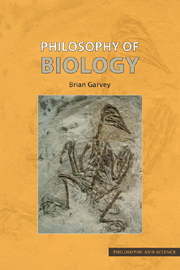Book contents
- Frontmatter
- Contents
- Acknowledgements
- Introduction
- 1 The argument in Darwin's Origin
- 2 The power of genes
- 3 Units of selection
- 4 Panglossianism and its discontents
- 5 The role of development
- 6 Nature and nurture
- 7 Function: “what it is for” versus “what it does”
- 8 Biological categories
- 9 Species and their special problems
- 10 Biology and philosophy of science
- 11 Evolution and epistemology
- 12 Evolution and religion
- 13 Evolution and human nature
- 14 Biology and ethics
- Notes
- Further reading
- Bibliography
- Index
13 - Evolution and human nature
- Frontmatter
- Contents
- Acknowledgements
- Introduction
- 1 The argument in Darwin's Origin
- 2 The power of genes
- 3 Units of selection
- 4 Panglossianism and its discontents
- 5 The role of development
- 6 Nature and nurture
- 7 Function: “what it is for” versus “what it does”
- 8 Biological categories
- 9 Species and their special problems
- 10 Biology and philosophy of science
- 11 Evolution and epistemology
- 12 Evolution and religion
- 13 Evolution and human nature
- 14 Biology and ethics
- Notes
- Further reading
- Bibliography
- Index
Summary
Much of the current public interest in evolution stems from the implications it has, or is alleged to have, for human nature. Darwin was aware of the possibility that it might have such implications: “In the distant future I see open fields for far more important researches. Psychology will be based on a new foundation, that of the necessary acquirement of each mental power and capacity by gradation. Light will be thrown on the origin of man and his history” ([1859] 1968: 458).
He took some steps in this direction himself with The Expression of the Emotions in Man and Animals (1872). Moreover, Freud attempted to give his work on the origins of religion and morals a Darwinian underpinning. Implausible though Freud's theories in this area seem today, one recent commentator has called Freud the “first evolutionary psychologist” (LeCroy 2000). In the mid-twentieth century, the idea that human beings have species-typical, evolved, “innate” mental characteristics fell out of favour in many quarters. This fall from favour was due to the influence of a number of different schools of thought, including Marxism, behaviourist psychology and the Margaret Mead school of anthropology. However, the evolutionary approach to psychology never completely disappeared. One of its manifestations was Desmond Morris's bestselling book The Naked Ape (1967). Along with Morris's many subsequent books, it must take much of the credit (or blame) for fuelling the enormous public interest that has since developed in evolutionary approaches to human nature.
- Type
- Chapter
- Information
- Philosophy of Biology , pp. 207 - 223Publisher: Acumen PublishingPrint publication year: 2007



